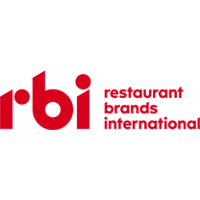
Restaurant Brands International Inc
NYSE:QSR

Intrinsic Value
The intrinsic value of one
 QSR
stock under the Base Case scenario is
68.64
USD.
Compared to the current market price of 63.22 USD,
Restaurant Brands International Inc
is
Undervalued by 8%.
QSR
stock under the Base Case scenario is
68.64
USD.
Compared to the current market price of 63.22 USD,
Restaurant Brands International Inc
is
Undervalued by 8%.
The Intrinsic Value is calculated as the average of DCF and Relative values:

Valuation History
Restaurant Brands International Inc

Fundamental Analysis

Restaurant Brands International’s ongoing challenges with Tim Hortons’ turnaround—particularly difficulties rejuvenating core coffee and breakfast menu sales—pose the biggest risk to topline growth, as the brand’s key Canadian market remains saturated and its international expansion has yet to establish strong footing.
RBI’s diverse brand portfolio—spanning Tim Hortons, Burger King, Popeyes, and Firehouse Subs—offers a powerful growth engine, allowing it to leverage cross-brand synergies, optimize supply chain costs, and strategically expand multiple concepts in both mature and emerging markets.

Revenue & Expenses Breakdown
Restaurant Brands International Inc

Balance Sheet Decomposition
Restaurant Brands International Inc

| Current Assets | 2.3B |
| Cash & Short-Term Investments | 1.3B |
| Receivables | 698m |
| Other Current Assets | 250m |
| Non-Current Assets | 22.4B |
| PP&E | 4.1B |
| Intangibles | 16.9B |
| Other Non-Current Assets | 1.4B |
Free Cash Flow Analysis
Restaurant Brands International Inc

| USD | |
| Free Cash Flow | USD |
Earnings Waterfall
Restaurant Brands International Inc

|
Revenue
|
8.4B
USD
|
|
Cost of Revenue
|
-3.5B
USD
|
|
Gross Profit
|
4.9B
USD
|
|
Operating Expenses
|
-2.6B
USD
|
|
Operating Income
|
2.3B
USD
|
|
Other Expenses
|
-1.3B
USD
|
|
Net Income
|
1B
USD
|
QSR Profitability Score
Profitability Due Diligence

Restaurant Brands International Inc's profitability score is 68/100. The higher the profitability score, the more profitable the company is.

Score
Restaurant Brands International Inc's profitability score is 68/100. The higher the profitability score, the more profitable the company is.
QSR Solvency Score
Solvency Due Diligence

Restaurant Brands International Inc's solvency score is 24/100. The higher the solvency score, the more solvent the company is.

Score
Restaurant Brands International Inc's solvency score is 24/100. The higher the solvency score, the more solvent the company is.
Wall St
Price Targets
QSR Price Targets Summary
Restaurant Brands International Inc

According to Wall Street analysts, the average 1-year price target for
 QSR
is 80.05 USD
with a low forecast of 67.67 USD and a high forecast of 97.65 USD.
QSR
is 80.05 USD
with a low forecast of 67.67 USD and a high forecast of 97.65 USD.
Dividends
Current shareholder yield for  QSR is
.
QSR is
.
Shareholder yield represents the total return a company provides to its shareholders, calculated as the sum of dividend yield, buyback yield, and debt paydown yield. What is shareholder yield?
The intrinsic value of one
 QSR
stock under the Base Case scenario is
68.64
USD.
QSR
stock under the Base Case scenario is
68.64
USD.
Compared to the current market price of 63.22 USD,
 Restaurant Brands International Inc
is
Undervalued by 8%.
Restaurant Brands International Inc
is
Undervalued by 8%.























































 You don't have any saved screeners yet
You don't have any saved screeners yet